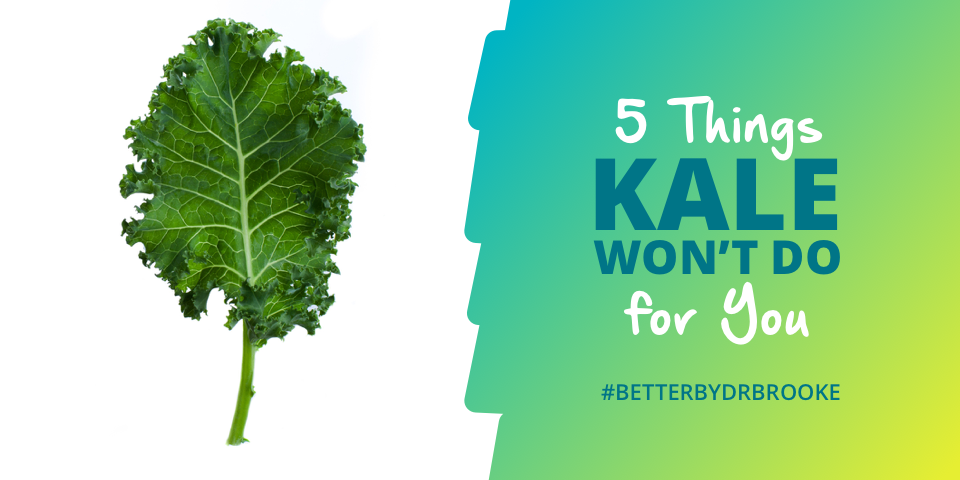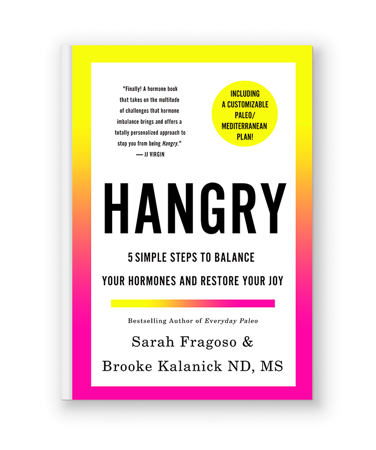
First, let me just say that I love and eat kale several times a week. I’m also the LAST person to tell you not to eat a leafy green for crying out loud, most all of us need to do more of that!
BUT there’s something I see more and more of – and have been guilty of myself – and that’s getting overly concerned about gettin’ in that kale, drinking a daily Kombucha or slugging down some celery juice and that is: failing to look at our stress.
There’s no amount of kale or green juice that will undo the effects of chronic stress.
Will that fiber and those vitamins boost your health and help with the effects of stress? Sure. But they will not get you in front of that train.
Stress is so pervasive for women and that chronic demand on your brain to signal cortisol release from your adrenals quickly begins to wreak havoc that ripples across your entire hormonal landscape. Stress and inflammation are our biggest hormone mess makers yet it’s often the thing we want to turn a blind eye to while we focus our attention on “doing healthy stuff” like eating kale.
There are many stresses you may not be able to resolve without help of a qualified functional medicine provider such as overt or borderline anemias, food intolerances, chronic infections, an unbalanced and unhealthy gut, blood sugar imbalances to name a few. However there are those daily mental and emotional stressors we get so good at living with and trying to ignore.
That conversation you don’t want to have, your far too overbooked schedule, that relationship you don’t want to get honest about, the constant internal criticism of yourself and your body. The truth you’re not telling, the you that you’re not being, the full engagement in your life you’re not living – it’s all very stressful.
And no amount of kale will fix it. Kale has some great properties and I’ll cover those in this post too! This isn’t about kale bashing.
#1 Kale Won’t Cure Chronic Stress
It can be hard to look at things like the toll our internal critical dialogue takes on us or how we’ve been so busy for so long all the while thinking “it will calm down soon” but it never does. These stresses are relentless and often we don’t even realize how bad it is or the toll it’s taking on our health and our hormones.
But take stock of that low level constant anxiety, that uneasy feeling that things are just off, that frustration that you’ve been green juicing your booty off and nothing’s getting better – could there be something you need to be brave enough to face?
We talk a lot about this on the Better Everyday with Sarah and Dr Brooke podcast: putting your toe into that hot water. It is gonna be uncomfortable for a second but you can do it and you can know that the only way get through it is to marinate in it.
This is our second third pillar: Full Engagement Living. If you want a FREE guide to the Five Pillars download it here.
Order Hangry right now!
If you’ve ever felt like a Hangry B*tch and are ready to balance your hormones and restore your joy in just 5 simple steps then Hangry is for you!
GET YOUR COPY NOW
Kale nor kombucha can save us from the stress of constantly distracting from our pain. De-stressing and self-care in this case won’t look like a bubble bath or a vacation, it will be facing that thing that feels too hard to face.
But you got this. And we got you. If you listen to the show or just want to be more connected to other women like you that are braving the hot water join our FREE, private Facebook group.
OK now on to a bunch of other stuff kale won’t do for you (hint: some good, some bad).
#2 Kale Won’t Make You Hypothyroid
This one is less of a myth and more of an exaggeration. Certain foods such as soy and Brassica veggies contain goitrogens which are compounds that block the uptake of iodine into your thyroid, which is a necessary component of thyroid hormone.
While this is a possibility you have to eat a whole lot of these veggies to impact your thyroid and this effect is negated by cooking, so even a light saute or steam solves the issue. And while this advice is widely espoused on the internet, you don’t have to guess if it’s an issue, you can simply look at your thyroid tests and you’ll see an elevated TSH and a low total T4. If you suspect this is what’s making you hypothyroid, stop eating so many brassica’s and if it resolves (TSH lowers and T4 goes up) then you have your answer.
So again this is a theoretical possibility but I can say that after being in practice for over a dozen years with a population of women that eats a lot of kale, broccoli and brussel sprouts I’ve never, ever seen this happen. So yes, possible but very unlikely.
#3 Kale Will Not Aggravate Histamine Issues
I’ve written about an increasingly more common hormone and inflammatory issue – histamine intolerance – and my personal struggle with it as well as how I help women heal this issue in this post. Remember as you read this post and list of symptoms, you don’t have to have all of them but if you have any of them histamine MAY be to blame.
Spinach is a fav green of mine however it’s a high histamine food so in effort to keep my histamine load lower and avoid the symptoms of painful periods, acne, vague itching, joint pain and fatigue that crop up when I overdo histamine containing or releasing foods, I skip it.
It’s an easy skip. I don’t sweat it that I don’t eat much spinach. It doesn’t make me sad like avoiding coffee and it’s way more convenient to eschew spinach than avoid gluten. I simply opt for another readily available green such as lettuce or kale that make the low histamine list. So here, kale is a winner.
#4 Kale Won’t Hinder Your Estrogen:Progesterone Balance
Getting a pound of veggies every day is a cornerstone of the 5 Habits that make up the program in our upcoming book HANGRY as these amazing foods provide so many nutrients and antioxidants but also give us that hangry helping fiber by leveling our blood sugar.
Not to mention veggie fiber feeds healthy gut bacteria that helps our hormonal and immune system balance overall but uniquely a healthy gut bacteria balance is an important part of estrogen metabolism.
There is a subset of gut bacteria now known as the estrobolome that modulates the enterohepatic (gut and liver) metabolism of estrogens in your system. These bacteria produce an enzyme called beta-glucuronidase which makes active, unbound estrogen that can bind your estrogen receptors. Basically estrogen that your body had metabolized and packed up for excretion, beta-glucuronidase unpacks it rendering it active again and potentially problematic. We need this enzyme to keep estrogen levels balanced and issues arise when we have too much or too little of it.
Order Hangry right now!
If you’ve ever felt like a Hangry B*tch and are ready to balance your hormones and restore your joy in just 5 simple steps then Hangry is for you!
GET YOUR COPY NOW
One of the biggest things I see with women following a Paleo or even standard American diet is eating plenty of protein and possibly overdoing the animal fat and at the same time not eating nearly enough veggies. A high red meat and high animal fat diet has been shown to be a factor in estrogen related issues such as breast cancer and one that can be tempered by being mindful of overall animal fat intake.
In HANGRY we recommend just 1-2 servings of fattier meats per week if you have any estrogen imbalances. Not sure? You can take my quiz here and find out. And of course the other thing you can do to maintain a healthy estrobolome is eat those veggies and of course kale can be part of that.
#5 Kale Will Never Be The Only Healthy Green
In fact it’s not even the healthiest green out there! Again, eat your kale but don’t forget about these other powerhouse greens many of which have a BETTER nutrient profile than the most popular girl at school: kale.
Research at William Paterson University ranked fruits and vegetables by their nutrient density, based on their levels of 17 different nutrients that have been linked to improved cardiovascular health. My fav, those leafy greens, packed out the top 16 but kale didn’t make the top ten.
Kale was beat out by spinach, Romaine lettuce and even parsley.
So by all means keep kale! It’s a great leafy green with diverse uses but don’t forsake these other greens for the ever popular kale:
Watercress is light and a lovely addition to a salad or on it’s own. It is high in vitamin K (238% of your daily recommended intake as a matter of fact) and has four times more beta carotene than an apple. It’s also the richest dietary source of PEITC (phenylethyl isothiocyanate), one of those cancer fighting phytochemicals that helps lessen our estrogen burden.
When it comes to cancer fighting and estrogen balance, broccoli sprouts may be the biggest win. Broccoli spouts have high levels of myrosinase which is an enzyme necessary for formation of the cancer fighter sulforaphane which gives broccoli it’s anti-inflammatory, estrogen detoxing, cancer fighting reputation. Fully mature broccoli also has this but most of it is destroyed in cooking (unless you steam it for less than 4 minutes. Broccoli sprouts have about 3.5 times more sulforaphane than regular broccoli but research shows that actually eating both mature broccoli and broccoli sprouts together gives you the most absorption of sulforaphane – so mix it up!
Beet greens and dandelion greens like their leafy green sisters are full of fiber and these bitter greens help stimulate enzyme production and bile flow aiding in digestion.
And finally collards! Analysis of this hearty green had a greater effect at cholesterol blocking than the prescription drug Cholestryramine. Try these steamed or sauteed – and I love a lightly steamed collard leaf as a wrap for a burger!
Keep the kale, but branch out with those greens…and remember kale won’t cure chronic stress but you can. Be brave enough to step into the hot water, you can do it.
